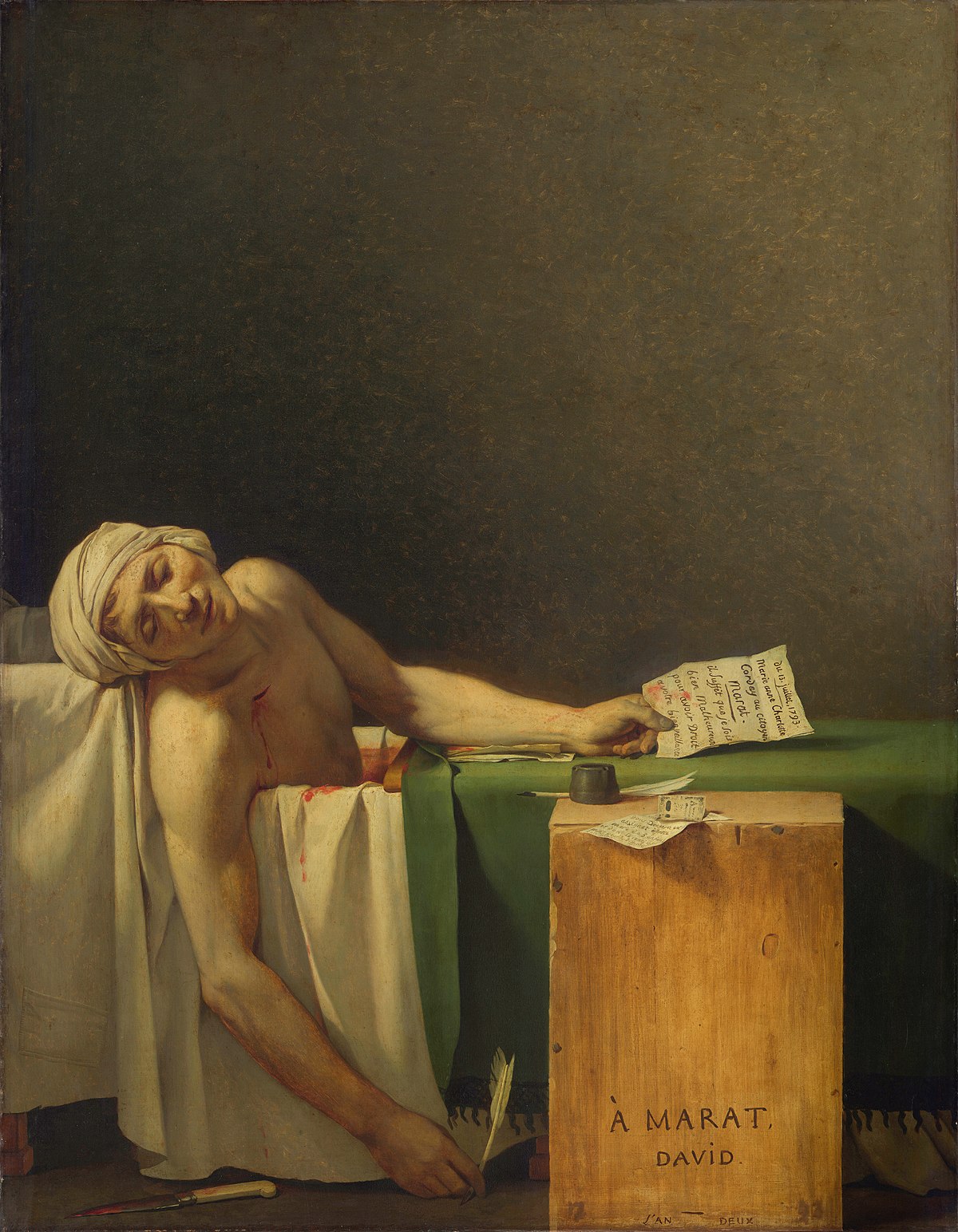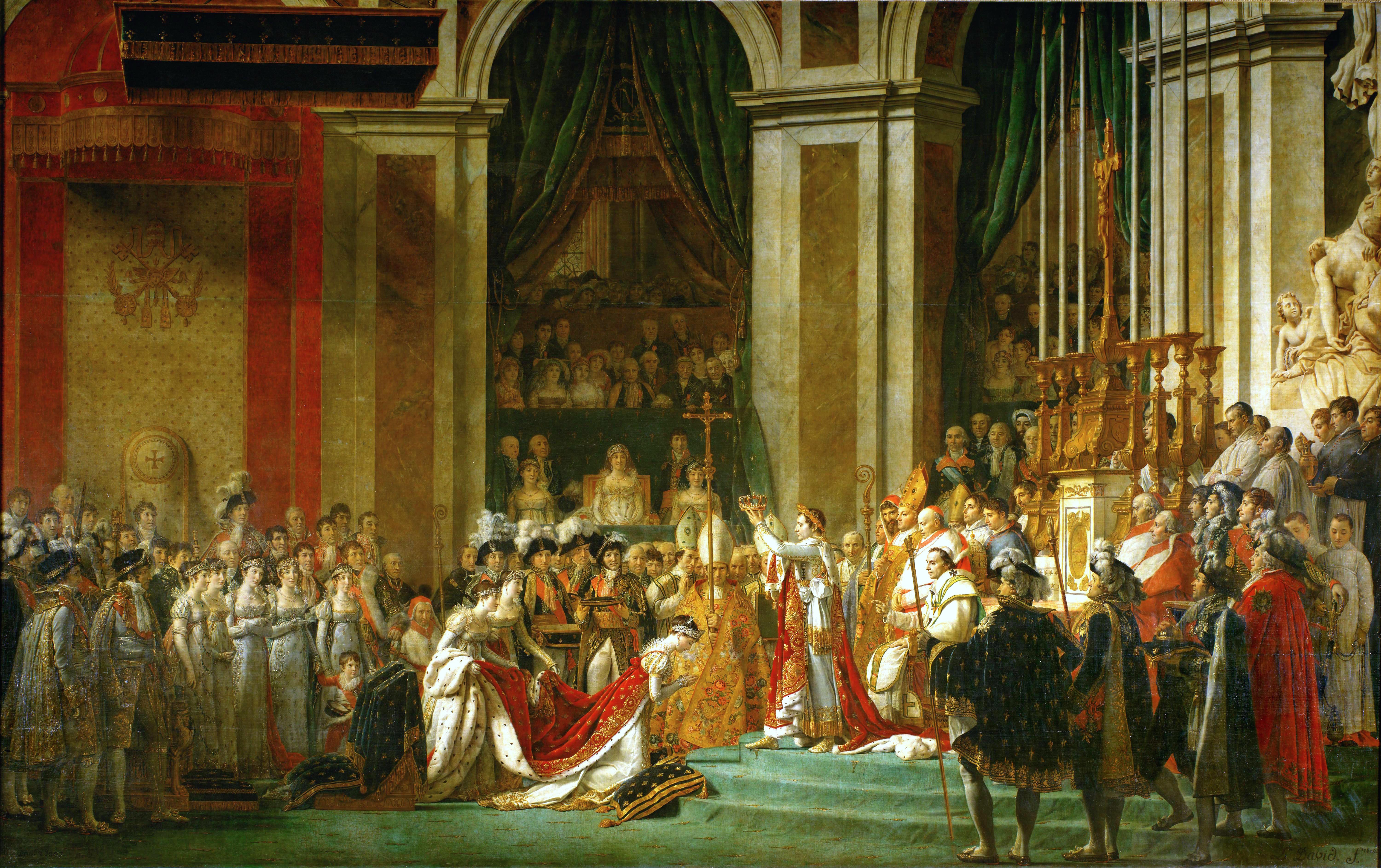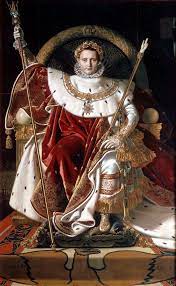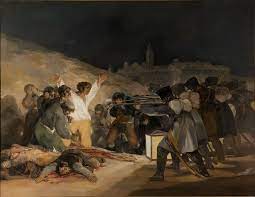AP Euro Unit 5
0.0(0)
Card Sorting
1/95
Earn XP
Description and Tags
AP Euro Unit 5 Vocab, People, Places, Literature and Art
Last updated 12:52 AM on 12/14/22
Name | Mastery | Learn | Test | Matching | Spaced | Call with Kai |
|---|
No analytics yet
Send a link to your students to track their progress
96 Terms
1
New cards
popular sovereignty
the political idea that power comes from the people, not God, and that it remains with the people
2
New cards
separation of powers
the political concept, advocated by Montesquieu, where government's powers are divided into different branches, such as executive and legislative
3
New cards
American Revolution (1775-1783)
the first successful revolt by a colony against rule by a European mother country. The 13 British colonies revolted against foreign rule. It ended in an American victory and the establishment of the first federal republic in history.
4
New cards
French and Indian War (1753-1763)
this was the North American theater (region) of the European conflict called the Seven Years' War. It was fought between Britain and its American colonies against France and its French colonies in North America. Most Native Americans fought for the French side in the conflict. It ended in a major British victory.
5
New cards
Declaration of Independence
one of the most important political documents ever written, it was inspired by the social contract theory of Locke and was written by Thomas Jefferson. It lays out the reasons for the American rejection of British rule.
6
New cards
First Estate
Pre-Revolutionary term for the Catholic clergy of France
7
New cards
Second Estate
Pre-Revolutionary term for the nobility of France
8
New cards
Third Estate
Pre-Revolutionary term for the masses of French society prior to the Revolution. It included peasants, bourgeoisie, and the urban poor.
9
New cards
peasants
one of the lower classes, they are rural, agricultural free laborers
10
New cards
sans-culottes
this was a slang term that referred to the urban working poor
11
New cards
bourgeoisie
term referring to the urban, educated middle and upper classes
12
New cards
taille
a hated tax paid only by the common people of France, not by the clergy or the nobility
13
New cards
Estates-General
the historic parliament of France, it was a body that the French king could consult at will. It lacked the same type of powers that the British Parliament possessed
14
New cards
cahiers de doleances
these were lists of grievances drawn up by each of the three estates; they were reform suggestions and included demands such as fair taxation and equal voting rights
15
New cards
National Assembly
the delegates of the Third Estate declared the end of the Estates-General and the formation of this as the new parliament of France. It was dominated by the bourgeoisie.
16
New cards
Tennis Court Oath
On June 20, 1789 the King ordered that the National Assembly be locked out of their meeting room. The delegates regrouped on a tennis court at Versailles and swore not to disband until they had written a constitution for France.
17
New cards
militias
a military force that is made up of civilians rather than soldiers, usually put together in times of emergency
18
New cards
Bastille
a large fortress in the heart of Paris that served as a hated prison. On July 14, 1789 a Paris mob stormed it in search of weapons. The mob killed several soldiers. This is a major event of the Revolution.
19
New cards
Great Fear
in the summer of 1789 a panic swept across France that the nobility was going to crush the new Revolution. Angry peasant mobs attacked the estates of the nobles and burned many to the ground.
20
New cards
manorial obligations
these were ancient requirements that peasants needed to work several days each month on the lands of the nobility
21
New cards
Declaration of the Rights of Man and Citizen by National Assembly
written by delegates of the National Assembly during the summer of 1789, this is the first constitution of France. It promised equal rights for all French men. Inspired by the writings of Montesquieu and Rousseau as well as Declaration of Independence and US Constitution
22
New cards
Civil Constitution of the Clergy
This is considered to be one of the first mistakes of the Revolution. This law required all French Catholic clergy to swear an oath of loyalty to the nation over the Church. It turned the Church into an enemy of the Revolution.
23
New cards
metric system
the most common system of measurement used in the world. It uses the meter, liter and gram as units of measure. It was first adopted by France during the Revolution
24
New cards
"Liberty, Equality, Fraternity"
this became the famous three-word motto of the Revolution; it sums up the ideals of the Revolution
25
New cards
Women's March
On October 5, 1789 thousands of Parisian poor women marched to Versailles to demand that King Louis XVI do something to lower the price of bread. It grew violent. The women forced the King and his family to leave Versailles and return to Paris.
26
New cards
Haitian Revolution
this was the successful slave revolt against European rule to occur. It began in 1791 when Black slaves overwhelmed the French planters in the Caribbean colony of Saint-Domingue. The slave rebels established the first Black ruled republic in world history and successfully defended their independence against Napoleon's attempt to reestablish French control.
27
New cards
inflation
a general increase in prices and a decline in the purchasing power of the money
28
New cards
emigres
French term for those French nobles who fled from revolutionary France and went to other European nations. Many helped the foreign powers against France.
29
New cards
Declaration of Pillnitz
a 1792 agreement between Austria and Prussia pledging to work together to crush the Revolution and to restore the old order in France
30
New cards
Legislative Assembly
this was a new French parliament that replaced the National Assembly in October 1791. It was dominated by the younger bourgeoisie who favored more radical reforms.
31
New cards
Jacobins
the most important political group to appear in the early Revolution. They were the most radical and violent faction in the National Convention. They ran the nation during the Reign of Terror.
32
New cards
Girondin
they were a moderate faction of the Jacobins who supported the Revolution but opposed extremism, such as the execution of the king
33
New cards
Mountain
they were the most radical faction of the Jacobins. They dominated France during the Reign of Terror. They supported the execution of the King and declared war on Austria and Prussia.
34
New cards
Reign of Terror
this was the most extreme and violent phase of the Revolution. Thousands of people were arrested and executed on the guillotine as enemies of the Revolution. It ended with the execution of Robespierre in July 1794.
35
New cards
National Convention
A new French parliament that was elected in the fall of 1792. It governed the nation during both the Terror and the Directory.
36
New cards
Committee of Public Safety
a group of 12 delegates, selected by the National Convention, given dictatorial power over France during the Reign of Terror. Robespierre emerged as the leader of this group.
37
New cards
Thermidorean Reaction
A brief, violent period during the summer of 1794 when several thousand leaders of the Terror were arrested and executed. Robespierre's execution in July 1794 began the reaction.
38
New cards
Directory
a new government formed after the end of the Terror. It was made up of 5 delegates selected by the Convention. It lasted from 1794 until Napoleon seized power in November 1799; dominated by wealthy interest groups who wanted an end to the extremes of the Terror who wanted to establish a regime controlled by wealthy, property owning interests
39
New cards
coup d'etat
a term for the overthrow of a legitimate government by military force
40
New cards
Archeology
the study of human history and prehistory through the excavation of artifacts
41
New cards
Rosetta Stone
an archeological wonder, this is a massive stone tablet from the 2nd century BCE, discovered by Napoleonic troops in Egypt in 1798. It contained the same message written in 3 different languages (hieroglyphics, Demotic, and ancient Greek)
42
New cards
Consulate
the first government of Napoleon, it lasted from November 1799 until he proclaimed the Empire in May 1804. Napoleon gradually emerged as the single ruler of the nation.
43
New cards
Concordat with the Church
an 1801 agreement between Napoleon and the Pope that ended the hostility between the Church and France. the Church recognized Napoleon as the rightful ruler of France and Napoleon restored much of the Church's rights (but not lands)
44
New cards
irreligious
indifferent or hostile to religion, or holding no religious beliefs at all
45
New cards
Code Napoleon (Napoleonic Code)
Authorized by Napoleon, a panel of judges wrote a national legal code for France in 1804 that replaced old regional feudal codes. It created a rational system of modern laws that was adopted by nations all over the world.
46
New cards
plebiscite
a direct vote by the common people on a significant people in which the choice is between "yes" and "no"
47
New cards
First (Grand) Empire
Began when Napoleon proclaimed himself Emperor in May 1804 and ended with his forced abdication in April 1814. The Empire was briefly restored during the Hundred Days of 1815.
48
New cards
balance-of-power
the European diplomatic goal of preventing any single nation from dominating the entire continent. Britain was especially dedicated to it.
49
New cards
puppet-state
A nation that is officially independent, but is in fact controlled by a different nation.
50
New cards
Grand Duchy of Warsaw
A Napoleonic puppet-state that lasted from 1807 - 1814. It restored a measure of Polish independence that Poland had lost after the partitions of the 1790's.
51
New cards
Confederation of the Rhine
A Napoleonic puppet-state that created the first unified German state since the Treaty of Westphalia in 1648. It lasted from 1806 - 1813.
52
New cards
Continental System
term for Napoleon's plan to ban all European trade with Britain in hopes of bringing that nation to economic ruin. It banned the sale of goods to Britain and the import of British goods to the continent.
53
New cards
economic warfare
the strategy of using economic tactics, such as tariffs and embargoes against rivals in hopes of causing financial collapse
54
New cards
Peninsular War (1807-1814)
a brutal conflict that began when Napoleon's forced occupied Spain. The Spanish, with British support, began a long, guerilla war that drained French strength during the conflict
55
New cards
guerilla warfare
a defensive military tactic where an inferior force utilizes tactics that defy the conventional rules of warfare such as the wearing of uniforms and the taking of prisoners
56
New cards
Invasion of Russia
The disastrous June 1812 military invasion of Russia by Napoleon's Grand Armee. The Russians retreated all summer, drawing the French deep into Russia. When the winter began the French began an epic retreat.
57
New cards
scorched earth
a military defensive tactic where a retreating army burns all resources that an advancing enemy could possibly use, including structures, towns, and fields of crops
58
New cards
Congress of Vienna
one of the most important diplomatic events in European history. Went from November 1814 to June 1815. The goal of the diplomats was to restore European order after the defeat of Napoleon.
59
New cards
Prince Metternich
Served as the Austrian Foreign Minister and later the Chancellor (Prime Minister) during most of the first half of the 1800's. His conservative views dominated European international politics for decades after the Congress of Vienna.
60
New cards
restoration
the act of returning a monarch to their throne, a government to power, or the control of a previous regime
61
New cards
legitimacy
something that is legal, rightful, or appropriate
62
New cards
Hundred Days
the period from March to July 1815 when Napoleon escaped from Elba and attempted to restore his control over France. It ended with his defeat at Waterloo and his capture and exile to St. Helena.
63
New cards
Battle of Waterloo
Decisive June 1815 battle, the last in Napoleon's career. He was defeated by Prussian and British forced led by the Duke of Wellington. Napoleon was later taken prisoner and sent to his final exile.
64
New cards
What is the Third Estate? by Abbe Sieyes
a pamphlet written by a French clergyman who had sympathies with the common people. He argued that the common people were the real France, not the nobility or even the Church. it inspired many people.
65
New cards
Declaration of the Rights of Women by Olympe de Gouges
The female author was angry that the Declaration of the Rights of Man seemed to leave the women of France out. She argued that since women paid the same taxes, obeyed the same laws, and were punished the same way, they should have the same privileges.
66
New cards
Reflections on the Revolution in France by Burke
This British work is the foundation of conservatism. He argued that the Revolution was too extreme and that no single generation had the right to destroy the work done by all previous generations.
67
New cards
Jacques Necker
financial advisor to Louis XVI that proposed taxing the nobility and the Church which led to a showdown in late 1788
68
New cards
Charles de Calonne
financial advisor to Louis XVI that proposed to tax the nobility and Church to ease France's debt
69
New cards
"one man, one vote"
voting rule advocated by the third estate in which each delegate would receive one vote
70
New cards
"all men are born and remain free and equal in rights."
opening line of the Declaration of the Rights of Man and Citizen
71
New cards
Saint-Domingue
France's most valuable colony and the western third of the island of Hispaniola; ideal for the production of sugar and generated great wealth for France
72
New cards
Toussaint L'Ouverture
former slave, natural leader, military strategist that was a leader during the Haitian Revolution; became recognized as the governor of the colony
73
New cards
Jacques Dessalines
Continued to fight Napoleon's forces after L'Ouverture was captured
74
New cards
Vendee
a rural region of France that had a counter-revolution that challenged the government's authority
75
New cards
Georges Danton
bourgeois lawyer that helped lead the Jaocbin club along with Robespierre
76
New cards
Maximilien Robespierre
led the Jacobin Club
77
New cards
The Second French Revolution
a desperate time that was the most violent and radical phase of the Revolution
78
New cards
September Massacre
September 1792 when mobs of san-culottes raged through the streets of Paris lashing out at perceived enemies of the Revolution; attacked a prison and massacred 1.2k captives inside and attacked the royal palace trying to kill the royal family
79
New cards
Jacobin Club
dominated the National Convention and favored the execution of the king and the proclamation of a republic; led by Maximilien Robespierre
80
New cards
'people's army'
recruited by the Committee of Public Safety to battle the foreign invaders and crush the counter-revolution; over 1 million men joined
81
New cards
Marie Antoinette
wife of Louis XVI, executed
82
New cards
Louis XVI
tried for treason in 1792 and executed in January
83
New cards
the Cult of the Supreme Being
a new pagan religion introduced by the Committee of Public Safety; churches were converted into temples of reason; anti-clerical views of the Enlightenment were behind this effort
84
New cards
Death of Marat by David

85
New cards
Charlotte Corday
assassinated one of Robespierre's closest allies, Dr. Marat
86
New cards
Napoleon Bonaparte
general who became national hero after challenging British control of Egypt; staged a coup d'etat against the government and seized power; military dictator and emperor of France and an example of an Enlightened Absolutist
87
New cards
Corsica
island seized by France in 1769, where Napoleon was born
88
New cards
Coronation of Napoleon by David

89
New cards
Imperial Bonaparte by Ingres

90
New cards
The Third of May by Francisco Goya

91
New cards
Tsar Alexander I
Russian ruler that was Napoleon's closest ally; after announcing his desire to trade with Britain Napoleon raised an army to attack Russia
92
New cards
Grand Coalition
alliance consisting of Austria, Britain, Prussia, Russia, and Spain that joined forced against Napoleon
93
New cards
Battle of the Nations
battle between Coalition and Napoleon in which Napoleon's army was badly defeated
94
New cards
Elba
tiny Mediterranean island to which Napoleon was exiled after being captured
95
New cards
Louis XVIII
Bourbon younger brother of Louis XVI; put on the French throne during the congress of vienna
96
New cards
St. Helena
remote island to which Napoleon was sent to during his final exile